How and why Qatar has emerged as a leading peace broker in Africa.
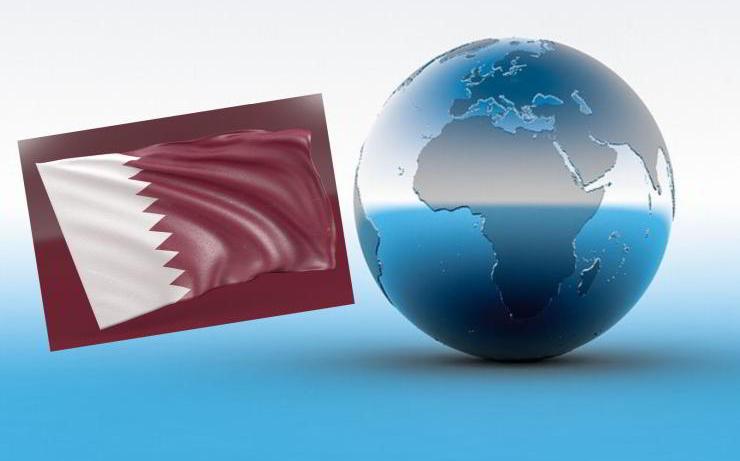
In recent years, Qatar has emerged as a significant peace broker in Africa, reflecting a growing Gulf involvement in the continent’s economy and politics. Sycophants praise the emirate as a soft power with no hidden agenda. However, the reality is not always so rosy.
On 18 March, Qatar made headlines by hosting a meeting in Doha between the presidents of the Democratic Republic of Congo, Felix Tshisekedi, and Rwanda, Paul Kagame. After the meeting, which was also attended by the Emir of Qatar, Sheikh Tamim bin Hamad Al Thani, the two African leaders reaffirmed their commitment to negotiating an immediate and unconditional ceasefire.
Subsequently, delegations from both countries met several times in Doha until the negotiations began to bear fruit. Indeed, on 25 April, the Congolese and Rwandan foreign ministers, Thérèse Kayikwamba Wagner and Olivier Nduhungireye, met in Washington with the US Secretary of State, Marco Rubio, to discuss the terms of an agreement that would guarantee peace and security in the Great Lakes Region while creating a favourable climate for American investment in the area.
The two ministers signed a “Declaration of Principles” to promote peace and economic development in the region and end the conflict in eastern DRC. The Washington agreement also follows a joint declaration on 23 April by the Congolese government on the one hand and the Congo River Alliance and the M23 on the other, who had been negotiating a ceasefire in Qatar at the same time. Time will tell whether the ceasefire will eventually take place and hold, but everyone recognised that bringing the warring parties together was an achievement in itself, as previous attempts by the African Union had failed.
One sign of this recognition came on 19 March, when UN Secretary-General António Guterres thanked the Emir of Qatar for his mediation to end the conflict in eastern DRC.
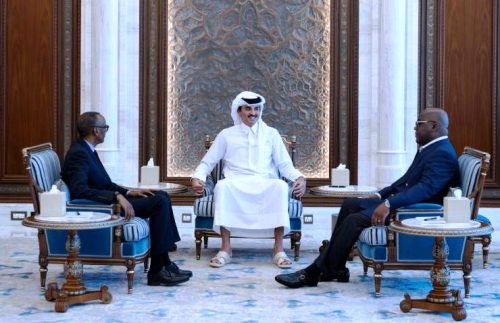
Democratic Republic of the Congo President Felix Tshisekedi and his Rwandan counterpart, Paul Kagame, meet with Qatar’s Emir Sheikh Tamim bin Hamad Al Thani in Doha, Qatar. (Photo: MOFA.gov.qa)
But this mediation is only the latest chapter in a longer saga of similar processes that have established Qatar as a major diplomatic hub. Indeed, the emirate has previously positioned itself as a mediator in a number of other conflicts in Africa.
Its record dates back to 2004, when Qatar secured the release of 100 Moroccan prisoners of war held by the Polisario Sahrawi movement in Tinduf. Qatar was also instrumental in securing a ceasefire between Djibouti and Eritrea in 2010. The emirate also facilitated a ceasefire in Darfur in 2013. Qatari diplomats also worked to restore diplomatic relations between Kenya and Somalia in 2021. Qatar also mediated peace talks in Chad between the government, rebel groups and political opponents in 2022. Elsewhere, Qatar has been involved in peace efforts for Lebanon and between the Taliban and the US government.
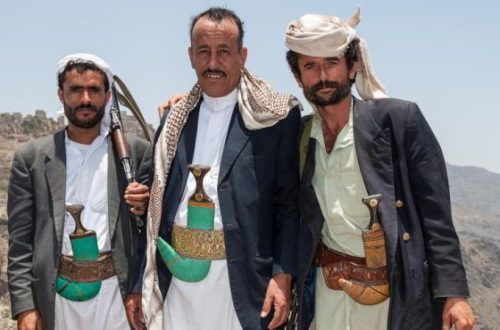
Militiamen Houthis. Doha has mediated between the Yemeni government and the Houthis. 123rf
It has also mediated between Palestinian movements, between Israel and Hamas, and between the Yemeni government and the Houthis. Such an impressive track record, Qatari officials explain, reflects a constitutional commitment to the peaceful resolution of international disputes and conflicts, as expressed in the Emirate’s constitution, which makes mediation a key foreign policy priority.
In the recent case of mediating the conflict in eastern Congo, Qatar’s influence is largely due to its track record, neutrality and economic involvement in both the DRC and Rwanda.
The Paris daily Le Monde recalls the close ties between the Emir of Qatar and Rwandan President Paul Kagame, which are taking concrete form with the construction of a new $1.6 billion airport east of the capital Kigali and the partnership between RwandAir and Qatar Airways. At the same time, in late 2022, Congolese President Felix Tshisekedi asked Qatar to mediate in the conflict with Rwanda. The previous year, during Tshisekedi’s visit to Doha, several cooperation agreements were signed between the DRC and Qatar.
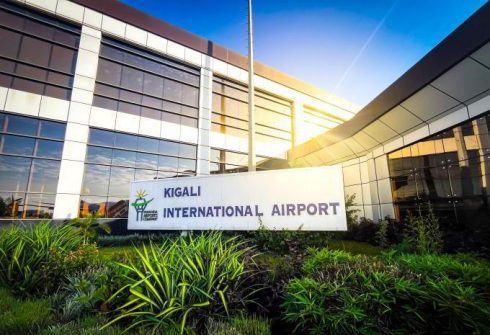
Airport terminal building at Kigali International Airport. the Emir of Qatar and Rwandan President Paul Kagame, which are taking concrete form with the construction of a new $1.6 billion airport east of the capital Kigali. Shutterstock/Africadventures
The list includes a framework agreement for economic, technical and trade cooperation to secure future investments, including the modernisation and development of the ports of Matadi, Kinshasa and Boma. Qatar Airways has also offered to enter into a partnership with the DRC’s aviation authority, RVA, for the modernisation, construction and financing of Ndjili and Ndolo airports in Kinshasa and Luano
airport in Lubumbashi.
Qatar is also funding several projects in the Sahel region, such as the Qatar Cancer Treatment Centre in Burkina Faso, inaugurated in 2021. Four years later, the Qatar Fund for Development signed a $50 million loan and grant agreement with Mali’s Ministry of Economy and Finance.
According to Dr Bakary Sambe, director of the Dakar-based Timbuktu Institute, Qatar’s mediation expertise could be useful in the coming years in the Sahel region to help these countries find a way out of terrorism. Nina Wilen, director of the Africa programme at the Brussels-based Egmont Royal Institute for International Relations, claims in a recent paper that “rumours also suggest that Qatar may be given a mediation role between the Malian military regime and both Islamist and separatist groups in the north.
Several factors may explain Qatar’s involvement in peace processes around the world, particularly in Africa. In the case of the Great Lakes conflict, Qatar is not only a major investor in both countries. It has also filled the gap left by the former coloniser, Belgium. In the past, before the Sun City peace agreement in 2002, Belgium made considerable efforts to bring together all the regional actors and to ensure that the United Nations and the European Union supported the process. This time, however, Belgium has clearly taken sides, urging the EU to impose sanctions on the Rwandan “aggressor”, which finally broke off diplomatic relations with Brussels last March. Moreover, Belgium’s economic influence in its three former African colonies has shrunk considerably, while Chinese and Indian investment continues to soar.
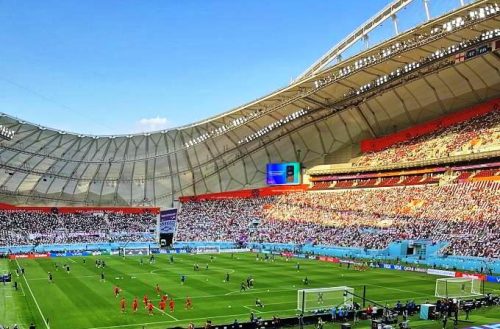
A view inside Khalifa International Stadium in Al Rayyan, Qatar, during a 2022 FIFA World Cup. Helping to find diplomatic solutions to conflicts is also another way of repairing the reputational damage caused by the abuses of World Cup workers. CC BY-SA 4.0/Standardwhale
More generally, soft power diplomacy has been a way for Qatar to break its diplomatic isolation on the international stage after the emirate refused to align itself with the anti-Iran and anti-Muslim Brotherhood positions of other Gulf states such as Saudi Arabia, Bahrein and the United Arab Emirates, which severed diplomatic ties with Doha in June 2017, until their resumption in January 2021.
Helping to find diplomatic solutions to conflicts is also another way of repairing the reputational damage caused by the abuses of World Cup workers exposed by Amnesty International and other human rights organisations, and by the Qatargate scandal, which consisted of more than 300 attempts to corrupt members of the European Parliament. According to a report published in December 2023 by the Brussels-based digital newspaper Politico, the actions included secret plans to kill parliamentary resolutions condemning Qatar’s human rights record and working towards a visa-free travel agreement between Doha and the EU.
A parliamentary assistant arrested by Belgian police has confessed that corrupt lawmakers changed the narrative in parliament during a committee hearing in April 2021 on Qatar’s preparations for the World Cup, which have come under intense criticism for the alleged exploitation of migrant workers.

Qatar’s involvement in African conflicts often coincides with an agenda of economic expansion.123rf
Some analysts stress that Qatar’s diplomatic success is due to the perception that the emirate has no hidden agenda. However, Qatar’s involvement in African conflicts often coincides with an agenda of economic expansion. Amid speculation about a future Qatari mediation role in the Sahel, the state-owned Qatar Mining Company expressed interest in gold exploration projects in Burkina Faso in 2022, where the Emir Sheikh promised to finance a US$240 million highway project between the capital Ouagadougou and the Ivorian border. A subsidiary of Qatar Mining Company is exploring for gold and copper in the Red Sea state of Sudan, where Qatar has been involved in several mediation efforts. Qatar Mining has also been awarded four gold exploration permits in western and southern Mali.
Qatar’s soft power policy and significant economic involvement in Africa are part of a wider context of growing Gulf involvement on the continent, argues Nina Wilen. This approach contrasts sharply with that of the United Arab Emirates, which has adopted a more militarised and transactional approach. Indeed, in 2019 the UAE and Mali signed a military cooperation agreement. The UAE also relies on mercenaries, proxies and logistics networks to support Libya’s National Army and Sudan’s Rapid Support Forces.
Whatever the nature of their engagement, says Wilen, the Gulf states’ presence is driven by a desire to shape outcomes in a region that offers new opportunities as Western states withdraw. As oil and gas producers are aware of the need for energy transition, the Gulf states also see their involvement in Africa as a way to diversify their economies. (Open Photo: Pixabay)
François Misser



